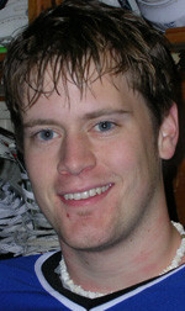
While most rising college seniors relax during their last free summer, Matt Crowson got a head-start on his upcoming Senior Fellowship with an internship at the University of Chicago Department of Medicine's Biomedical Informatics Center. The Center uses computer applications to sift through vast amounts of biochemical information in the hope of accelerating the pace of medical research. An aspiring M.D./Ph.D., Crowson reports that he tackled a cutting-edge project called "BioMedLEE."
According to Crowson, "BioMedLEE is a natural language processor that aims to integrate phenotypic information buried in biomedical literature with that of genomic databases." Although that sounds confusing, Crowson offers a more revealing explanation: "A natural-language processor is basically an artificial intelligence process that enables a computer to comprehend human communication, such as identifying verbs, nouns, and modifiers in a written sentence."
The program, which understands 750 grammatical rules has more than a million terms and concepts in its database, will help to search through the medical research at lightning speed in hopes of organizing the mess of information that biomedical scientists have accumulated, matching it up with genetic databases in order to identify problematic genes more quickly. Crowson notes that "this system is very powerful, and the Biomedical Informatics center has used it to uncover a molecular process that may cause a collection of cancer types."
This new program has a myriad of other promising applications. Crowson explains that "BioMedLEE could theoretically be used to crunch other types of data like electronic medical records, microarray findings, or pretty much any type of data that is published in scientific literature." Natural language processing systems like BioMedLEE are important, he adds, because of the sheer volume of data that research groups are generating today: "The process of digging up, sorting, breaking down, and classifying data done manually would take way too long to be of any use," he says, predicting that "the future lies in getting computers to do this for us."
Crowson gained much hands-on experience in anticipation of the M.D./Ph.D. he intends to pursue. He is a co-author on three different publications that have been submitted relating to the BioMedLEE project: first, a book review on Grid Computing and Bioinformatics, submitted to the journal BMC Bioinformatics; a chapter called "Natural-language processing (NLP) systems and clinical database output," written for an upcoming "Encyclopedia of Database Systems"; and fianlly, a paper on BioMedLEE itself to be submitted to the 2009 AMIA Summit on Translational Bioinformatics in San Francisco. Crowson's career as a medical researcher is off to an excellent start, as the abstract that he co-authored for his Senior Fellowship was just accepted to the Canadian Cardiovascular Congress conference and is being considered by the American Heart Association Conference.
Although he keeps busy with academic pursuits, Crowson manages to fit in a gamut of extracurricular activities as well. The biology major from Kanata, Ontario, is a member of the Psi Upsilon fraternity, serves as the Community Service Chair for the Intersociety Council, and will be the head resident advisor next year, among other activities.
Posted August 21, 2008
